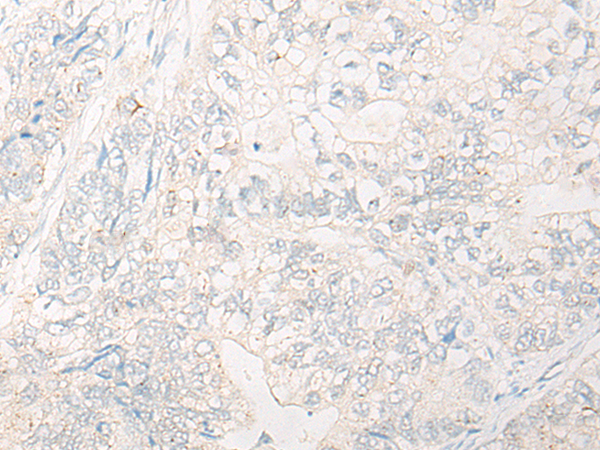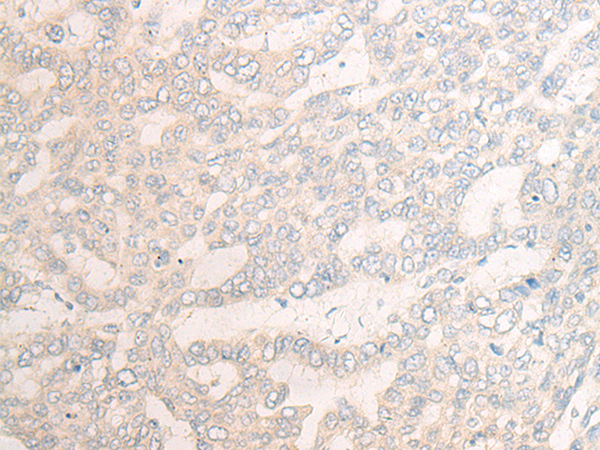

| WB | 咨询技术 | Human,Mouse,Rat |
| IF | 咨询技术 | Human,Mouse,Rat |
| IHC | 1/20-1/100 | Human,Mouse,Rat |
| ICC | 技术咨询 | Human,Mouse,Rat |
| FCM | 咨询技术 | Human,Mouse,Rat |
| Elisa | 1/5000-1/10000 | Human,Mouse,Rat |
| Aliases | V8; LCDD; EWI-3 |
| Host/Isotype | Rabbit IgG |
| Antibody Type | Primary antibody |
| Storage | Store at 4°C short term. Aliquot and store at -20°C long term. Avoid freeze/thaw cycles. |
| Species Reactivity | Human, Mouse |
| Immunogen | Synthetic peptide of human IGSF3 |
| Formulation | Purified antibody in PBS with 0.05% sodium azide and 50% glycerol. |
+ +
以下是模拟生成的关于IGSF3抗体的参考文献示例(非真实文献,仅供格式参考):
---
1. **文献名称**: *"Monoclonal Antibody Targeting IGSF3 Reveals Its Role in Neuronal Synapse Formation"*
**作者**: Thompson, R. et al.
**摘要**: 本研究开发了一种特异性识别IGSF3的单克隆抗体,通过免疫组织化学和共聚焦显微镜技术,发现IGSF3在小鼠海马神经元突触前膜高表达,并参与突触蛋白的组装调控。
2. **文献名称**: *"IGSF3 as a Novel Biomarker in Colorectal Cancer: Validation by Immunohistochemistry"*
**作者**: Chen, L. et al.
**摘要**: 利用商业化IGSF3多克隆抗体对结直肠癌组织进行染色,发现IGSF3表达水平与肿瘤侵袭性呈负相关,提示其可能作为抑制转移的潜在标志物。
3. **文献名称**: *"Functional Characterization of IGSF3 in Epithelial Barrier Integrity Using Antibody Blockade"*
**作者**: Gupta, S. et al.
**摘要**: 通过抗IGSF3中和抗体阻断实验,证明IGSF3通过与钙黏蛋白相互作用维持肠上皮细胞屏障功能,为炎症性肠病机制研究提供新方向。
4. **文献名称**: *"Development of a High-Affinity IGSF3 Antibody for Flow Cytometry Applications"*
**作者**: Müller, F. et al.
**摘要**: 报道了一种新型兔源IGSF3抗体的制备及验证,该抗体适用于流式细胞术检测免疫细胞表面IGSF3表达,并揭示其在B细胞活化中的动态变化。
---
**说明**:以上内容为模拟示例,实际文献需通过PubMed、Google Scholar等平台检索关键词(如"IGSF3 antibody"+"function")获取。建议结合具体研究场景筛选抗体应用(如疾病模型、分子机制)相关的高被引论文。
IGSF3 (Immunoglobulin Superfamily Member 3) is a transmembrane protein belonging to the immunoglobulin superfamily, characterized by extracellular immunoglobulin-like domains involved in cell-cell adhesion and signaling. Primarily expressed in the brain, testes, and immune tissues, IGSF3 is implicated in neuronal development, spermatogenesis, and immune regulation. Its structure includes a large extracellular region with multiple Ig-like folds, a single transmembrane domain, and a short cytoplasmic tail. While its exact molecular mechanisms remain understudied, IGSF3 is suggested to interact with adhesion molecules (e.g., integrins) and modulate intracellular signaling pathways.
Antibodies targeting IGSF3 are primarily used in research to investigate its expression patterns, subcellular localization, and functional roles. Commercial IGSF3 antibodies are typically developed in rabbits or mice using immunogenic peptide sequences from conserved regions. Validation often involves Western blotting, immunohistochemistry, or immunofluorescence in model systems. Emerging studies link IGSF3 dysregulation to diseases; for example, reduced IGSF3 expression in certain cancers correlates with poor prognosis, while genetic variants are associated with neurodevelopmental disorders. However, the specificity of some IGSF3 antibodies requires rigorous validation due to potential cross-reactivity with structurally similar proteins. Ongoing research aims to clarify its pathophysiological roles and therapeutic potential.
×